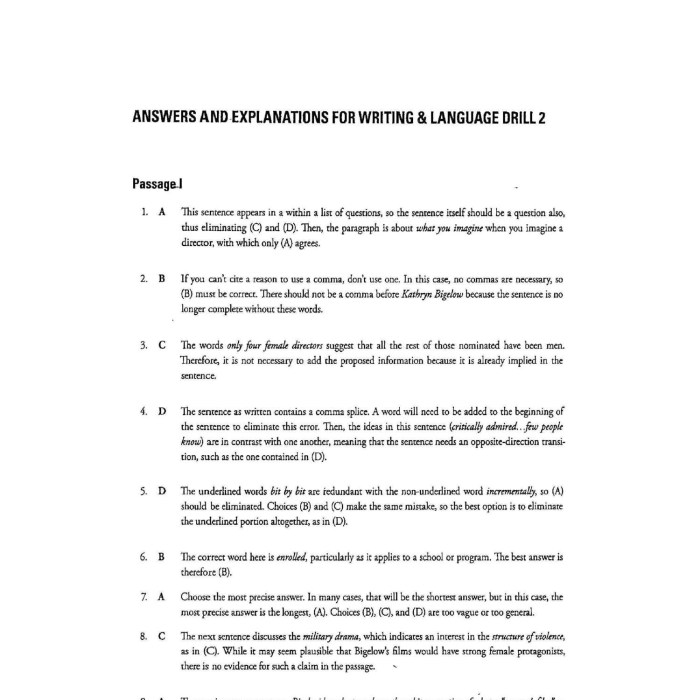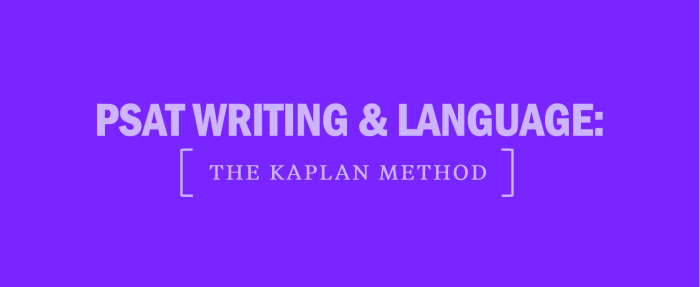Embark on a comprehensive exploration of writing and language test answers, where we delve into the intricacies of language proficiency assessment, effective test-taking strategies, and the nuances of preparation and practice. This guide empowers test-takers with invaluable insights and practical techniques to excel in these crucial examinations.
Writing and language tests serve as gateways to academic and professional opportunities, providing a standardized measure of an individual’s language skills. Understanding the format, structure, and evaluation criteria of these tests is essential for success.
Test Format and Structure

Writing and language tests typically follow a structured format that includes sections designed to assess different aspects of language proficiency. The test may consist of multiple-choice questions, short-answer questions, essay writing, and grammar exercises.
Multiple-choice questions present candidates with a question or incomplete statement and several possible answers, from which they must select the most appropriate option. Short-answer questions require candidates to provide brief written responses to questions or prompts.
Essay writing tasks assess candidates’ ability to express themselves in written form, organize their thoughts, and demonstrate their knowledge of the language. Grammar exercises test candidates’ understanding of grammar rules and their ability to apply them correctly.
Language Proficiency Assessment
Writing and language tests evaluate language proficiency in various areas:
- Grammar:Tests candidates’ understanding of grammar rules and their ability to use them correctly.
- Vocabulary:Assesses candidates’ knowledge of words and their meanings.
- Writing skills:Evaluates candidates’ ability to write clearly, coherently, and effectively.
- Reading comprehension:Tests candidates’ ability to understand written text and extract information from it.
Language proficiency is typically evaluated using a combination of methods, including multiple-choice questions, short-answer questions, essay writing, and grammar exercises.
Test-Taking Strategies
Effective test-taking strategies can help candidates perform better on writing and language tests:
- Time management:Allocate time wisely for each section of the test.
- Answering different question types:Understand the different question types and develop specific strategies for each.
- Managing stress:Stay calm and focused during the test.
- Review and check:Take time to review answers before submitting.
Common Challenges and Pitfalls
Candidates may face challenges in writing and language tests, including:
- Time constraints:Tests are often timed, which can lead to stress and errors.
- Unfamiliar vocabulary:Tests may contain unfamiliar or technical terms.
- Complex grammar rules:Candidates may struggle with complex grammar rules or exceptions.
- Writing under pressure:Writing essays or short answers under time pressure can be challenging.
To avoid pitfalls, candidates should:
- Practice regularly and familiarize themselves with the test format.
- Expand their vocabulary and study grammar rules thoroughly.
- Manage their time effectively during the test.
- Stay calm and focused.
Preparation and Practice

Adequate preparation is crucial for success in writing and language tests:
- Study materials:Use textbooks, online resources, and practice tests.
- Practice writing:Write essays, short answers, and grammar exercises regularly.
- Review grammar rules:Focus on understanding and applying grammar rules correctly.
- Expand vocabulary:Learn new words and their meanings.
Regular practice and preparation will help candidates improve their language skills and perform better on writing and language tests.
Scoring and Evaluation: Writing And Language Test Answers

Writing and language tests are scored using specific criteria:
- Grammar:Correct use of grammar rules and sentence structure.
- Vocabulary:Range and accuracy of vocabulary used.
- Writing skills:Clarity, coherence, and organization of written responses.
- Reading comprehension:Ability to understand and extract information from written text.
Scores are typically reported on a scale, such as a percentage or a grade, and may be used to determine a candidate’s language proficiency level or eligibility for a particular program or institution.
Sample Questions and Exercises
Sample questions and exercises can provide candidates with a better understanding of the types of questions they may encounter in writing and language tests:
- Multiple-choice question:Select the best answer from a list of options.
- Short-answer question:Write a brief response to a question or prompt.
- Essay question:Write an essay on a given topic.
- Grammar exercise:Identify and correct grammatical errors in a sentence.
Answer keys or guidance for evaluating responses can help candidates assess their understanding and identify areas for improvement.
Question Bank
What are the common challenges faced in writing and language tests?
Time constraints, unfamiliar question formats, anxiety, and limited vocabulary are common challenges faced by test-takers.
How can I effectively prepare for writing and language tests?
Engage in regular practice, familiarize yourself with test formats, enhance your vocabulary, and seek feedback on your writing.
What strategies can I employ during the test to manage time effectively?
Prioritize questions based on difficulty, allocate time wisely, and avoid spending excessive time on any single question.